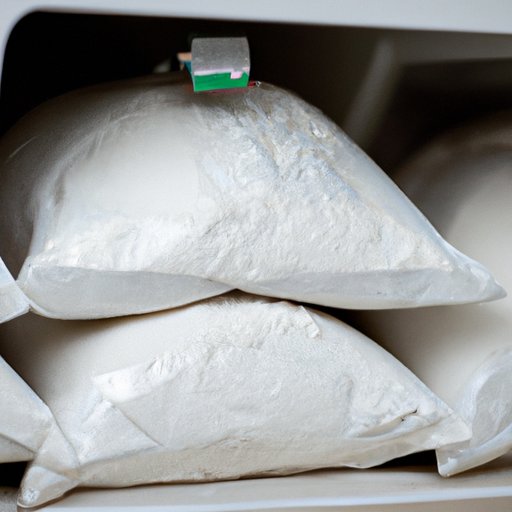Introduction
Flour is a key ingredient in many recipes. It is made from ground grains and used to make breads, pastries, cakes, and other baked goods. While it’s easy to find in grocery stores, it can be tricky to store properly. Storing flour in the freezer is an effective way to extend its shelf-life and keep it fresh for longer. In this article, we’ll explore the ins and outs of storing flour in the freezer and provide tips on how to do it safely and effectively.
A Guide to Properly Storing Flour in the Freezer
Before you freeze your flour, there are a few things to consider. First, make sure that the flour is completely dry. Any moisture will cause the flour to clump and form lumps when frozen. Also, make sure the container you use is airtight. This will prevent moisture from entering the container and keep the flour from becoming stale.
Once you’ve taken these precautions, you can start the freezing process. Start by transferring the flour from its original packaging into an airtight container. Make sure to label the container with the date of freezing and expiration date. Then place the container in the freezer and let it sit for at least 24 hours. This will ensure that the flour is thoroughly frozen.

How to Keep Your Flour Fresher for Longer with Freezing
Freezing your flour has several advantages. It prevents bacteria and mold from growing on the flour, which can cause it to go bad. It also prevents the flour from absorbing odors from other foods in the freezer, which can affect its flavor. Plus, freezing your flour helps to preserve its nutritional value.
To maintain the freshness of your frozen flour, make sure to keep it tightly sealed. This will prevent moisture from entering the container and help to keep the flour from becoming stale. You should also check the expiration date regularly and discard any flour that is past its date.
Is It Safe to Freeze Flour?
When it comes to food safety, freezing flour is generally safe. However, it’s important to follow proper food safety guidelines. Make sure that the flour is completely dry before freezing it, as any moisture can lead to bacterial growth. Also, make sure to store the flour in an airtight container to prevent moisture from entering the container.
It’s also important to remember that frozen flour can still go bad. If the flour has been stored for too long or has been exposed to moisture, it can develop mold or become rancid. If this happens, it’s best to discard the flour and replace it with a new batch.

The Pros and Cons of Freezing Flour
Like any food storage method, freezing flour has both advantages and disadvantages. On the plus side, freezing flour can extend its shelf-life and keep it fresher for longer. It can also help to preserve the nutritional value of the flour. On the downside, freezing flour can cause it to become clumpy and difficult to work with. It can also make the flour less flavorful.

How to Tell if Your Flour Has Gone Bad and When to Replace It
The easiest way to tell if your flour has gone bad is to take a look at it. If the flour is discolored or has a musty smell, it’s best to discard it and replace it with a new batch. You should also check the expiration date on the package and discard any flour that is past its date.
Tips and Tricks for Storing Flour in the Freezer
When it comes to storing flour in the freezer, there are a few things to keep in mind. Glass jars and plastic containers are the best options for freezing flour, as they are airtight and won’t absorb any odors from other foods. It’s also a good idea to label the containers with the date of freezing and expiration date. This will make it easier to keep track of the freshness of the flour.
What You Need to Know About Freezing Flour for Optimal Shelf-Life
Freezing flour can help to extend its shelf-life, but it’s important to keep a few things in mind. First, make sure that the flour is completely dry before freezing it. Also, make sure to store the flour in an airtight container to prevent moisture from entering the container. Finally, check the expiration date regularly and discard any flour that is past its date.
In terms of nutrition, frozen flour can still retain most of its nutritional value. However, it is important to note that some vitamins and minerals may be lost due to the freezing process. As for how long frozen flour will last, it depends on the type of flour and how it was stored. Generally speaking, frozen flour can last up to a year, though it’s best to check the expiration date regularly.
Conclusion
Storing flour in the freezer is a great way to extend its shelf-life and keep it fresh for longer. However, it’s important to follow proper food safety guidelines to ensure that the flour is safe to eat. Make sure to keep the flour dry before freezing it, store it in an airtight container, and check the expiration date regularly. With these tips, you can keep your flour fresher for longer and enjoy delicious baked goods for months to come.


